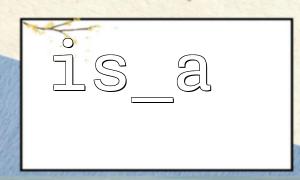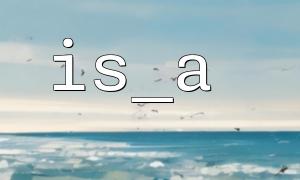In PHP, one of the common ways to determine if an object is an instance of a specific class or its subclass is by using the is_a() function. The is_a() function checks whether an object is an instance of a given class or if it inherits from that class. Even when the target class is an abstract class, this function works as expected.
This article focuses on how to use is_a() to check if an object is an instance of a specific abstract class. Example code will demonstrate the actual usage and points to note.
The basic syntax of the is_a() function is as follows:
is_a(object $object, string $class_name, bool $allow_string = false): bool
$object: The object to check.
$class_name: The class name (supports string format).
$allow_string: Whether to allow the first parameter to be a class name string. Default is false.
This function returns a boolean value true or false, indicating whether the object is an instance of the given class or its subclass.
An abstract class (abstract class) itself cannot be instantiated, but it can be inherited. Objects created by inheriting a concrete subclass of an abstract class are also considered instances of the abstract class. Therefore, determining whether an object is an instance of an abstract class is, in fact, checking whether the object is an instance of a subclass of that abstract class.
The following example demonstrates how to use is_a() to check if an object is an instance of a specific abstract class.
<?php
<p>// Define abstract class Animal<br>
abstract class Animal {<br>
abstract public function makeSound();<br>
}</p>
<p>// Concrete class Dog inheriting from Animal<br>
class Dog extends Animal {<br>
public function makeSound() {<br>
return "Woof!";<br>
}<br>
}</p>
<p>// Concrete class Cat inheriting from Animal<br>
class Cat extends Animal {<br>
public function makeSound() {<br>
return "Meow!";<br>
}<br>
}</p>
<p>$dog = new Dog();<br>
$cat = new Cat();</p>
<p>// Check if $dog is an instance of Animal abstract class<br>
if (is_a($dog, 'Animal')) {<br>
echo "Dog is an instance of the Animal abstract class" . PHP_EOL;<br>
} else {<br>
echo "Dog is not an instance of the Animal abstract class" . PHP_EOL;<br>
}</p>
<p>// Check if $cat is an instance of Animal abstract class<br>
if (is_a($cat, 'Animal')) {<br>
echo "Cat is an instance of the Animal abstract class" . PHP_EOL;<br>
} else {<br>
echo "Cat is not an instance of the Animal abstract class" . PHP_EOL;<br>
}</p>
<p>// Check if $dog is an instance of Cat class<br>
if (is_a($dog, 'Cat')) {<br>
echo "Dog is an instance of the Cat class" . PHP_EOL;<br>
} else {<br>
echo "Dog is not an instance of the Cat class" . PHP_EOL;<br>
}<br>
?><br>
Output:
Dog is an instance of the Animal abstract class
Cat is an instance of the Animal abstract class
Dog is not an instance of the Cat class
Class Names Are Case-Sensitive
is_a() is case-sensitive when checking class names.
Interface Check
is_a() can also be used to check if an object implements a specific interface.
Passing a String
If the first parameter is a class name string instead of an object, the third parameter must be set to true.
if (is_a('Dog', 'Animal', true)) {
echo "Dog class is a subclass of Animal" . PHP_EOL;
}
Compatibility
is_a() has supported the third parameter since PHP 5.3.
Using PHP's is_a() function to check if an object is an instance of an abstract class is simple and intuitive. As long as you know the name of the abstract class, you can pass the object and class name to get the result. This is very useful for type checking and polymorphism in object-oriented programming.














